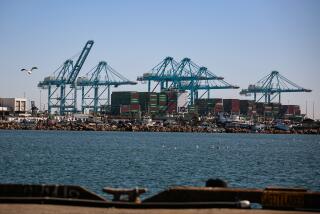Port strike: SoCal loses work as ships shift to Oakland, Mexico
The slow season for cargo traffic has already begun at the ports of Los Angeles and Long Beach, but if anyone thought that meant that a clerical workers’ strike at the facility would not have much of an impact, they were wrong.
One container ship laden with goods to be imported into the U.S. has already been diverted to Oakland because of the strike, which that has idled 10 of the 14 cargo terminals at the nation’s busiest seaport complex, according to the Marine Exchange of Southern California.
A second ship that was also bound for San Pedro Bay has been diverted to a port in Mexico, said Capt. Dick McKenna, executive director of the Marine Exchange, which tracks local ship movements.
Three more container ships that were expected to arrive at either Los Angeles or Long Beach but are significantly overdue are presumed to have also been diverted to other ports, McKenna said.
Quiz: Why are California gas prices so high?
This means that a strike that began at just one cargo terminal Tuesday and spread to nine more on Wednesday is already resulting in lost work for product supply chain employees such as truck drivers, railroad workers, warehouse workers and logistics employees, among others.
“They are stranding cargo at ports that handle 40% of the nation’s Asian import trade,” said Jock O’Connell, an international trade economist who works as an advisor to Beacon Economics.
The strike was called by the roughly 800-member International Longshore and Warehouse Union Local 63’s Office Clerical Unit. These are the workers who handle the paperwork for most ships entering and leaving the harbor.
The strike has clout because ILWU dockworkers, who load and unload the ships and negotiate their labor contracts separately, are honoring the clerical workers’ picket lines.
“Longshoremen stand up when other workers need our help,” said Ray Ortiz, Jr., a member of the ILWU’s Coast Committee. “Sure, it’s a sacrifice to give up a paycheck when you refuse to cross the picket, but we believe it’s in the long-term interest of the Los Angeles-Long Beach Harbor area to retain these good local jobs.”
But that also leaves Los Angeles and Long Beach as the only ports on North America’s Pacific coast that are not fully open for business.
The union claims they have lost about 50 jobs through the attrition that have subsequently been filled in places like Texas and Taiwan.
But Stephen Berry, lead negotiator for the shipping lines and cargo terminals, accuses the union of featherbedding, or trying to get jobs filled when the positions are not needed.
Berry says the clerical workers have been offered a deal that would be the envy of most Americans: “absolute job security;” a raise that would take average annual pay from $165,000 to $195,000, 11 weeks paid vacation, and a generous pension increase.
Politicians, national retailers and others have weighed in, urging both sides to get back to the bargaining table. Retailers have even asked President Obama to intercede to force both sides back to the bargaining table.
On Wednesday night, Los Angeles Mayor Antonio Villaraigosa added his voice in a letter to both sides.
“The city of Los Angeles needs both of you to get back to the bargaining table this week, to work with a mediator, and to hammer out a settlement before further harm is done to our local economy,” Villaraigosa wrote in his letter. “There is no time to waste.”
Perhaps no one was more bothered by the strike than Wally Baker, president of the Jobs1st Alliance, which had put together a slick video and Web-based presentation less than a year ago in which the theme of “Beat the Canal” was hammered home.
That was a reference to the fact that new Panama Canal locks that could accommodate big ships were scheduled to open in 2014, threatening to take as many as 100,000 cargo jobs from the Southern California region.
In the video, dockworker labor and cargo terminal managers raised their voices together, saying “Beat the Canal.”
Wally Baker said, “Both sides need to sit down and get this thing fixed before it gets out of control, for the good of all of the people whose jobs depend on these two ports.”
ALSO:
Rising labor unrest in the U.S.
Striking union expands walkout at local ports
Google+ Hangout: 400,000 California could lose jobless benefits







